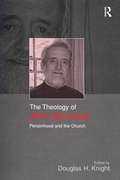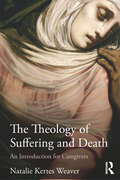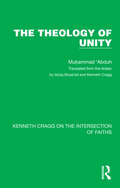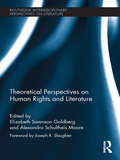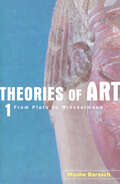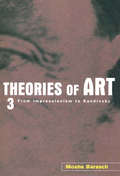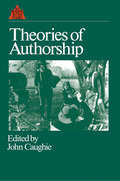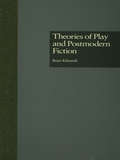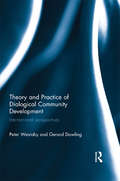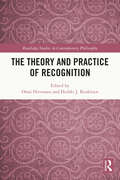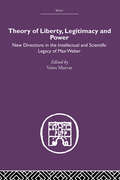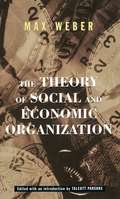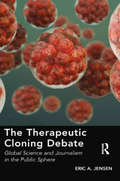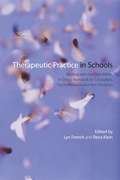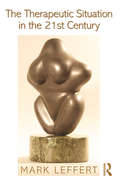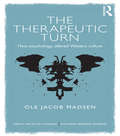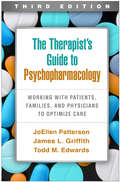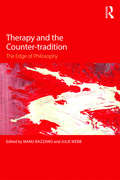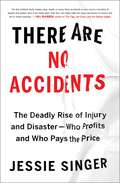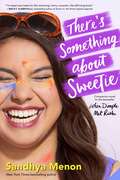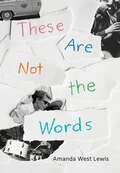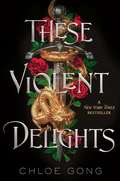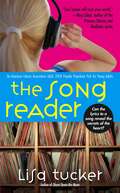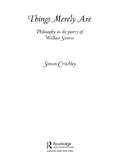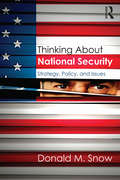Special Collections
Benetech’s Global Certified Accessible Titles
Description: Benetech’s GCA program is the first independent third-party EPUB certification to verify ebook accessibility. By creating content that is born accessible, publishers can meet the needs of all readers. Learn more: https://bornaccessible.benetech.org/
- Table View
- List View
The Theology of John Zizioulas
by Douglas H. KnightJohn Zizioulas is widely recognised as the most significant Orthodox theologian of the last half century and acclaimed advocate of ecumenism. From his indepth knowledge of the intellectual resources of the Church, Zizioulas has argued that the Church Fathers represent a profound account of freedom and community that represents a radical challenge to modern accounts of the person. Zizioulas uses the work of the Fathers to make an important distinction between the person, who is defined by a community, and the individual who defines himself in isolation from others, and who sees community as a threat to his freedom. Zizioulas argues that God is the origin of freedom and community, and that the Christian Church is the place in which the person and freedom come into being. This volume offers a critical appraisal of the theology of John Zizioulas. Leading Anglican, Reformed, Catholic and Orthodox international scholars, including Colin Gunton, Nicholas Loudovikos, Paul McPartlan, Wolfhart Pannenberg and Philip Rosato present essays which analyse Zizioulas' trinitarian doctrine of God, and his theological account of the Church as the place in which freedom and communion are actualised. Many include discussions of Zizioulas' Being as Communion as well as other lesser known works, now available in Communion and Otherness. Together they represent an unrivalled introduction to the work of this great theologian.
The Theology of Suffering and Death
by Natalie Kertes WeaverThis book offers a theological foundation for engaging with the realities of suffering and dying. Designed particularly for practical theology students and trainee caregivers, it introduces the spiritual and theological issues raised by suffering and dying. The chapters consider: how Christian theology deals with the problem of suffering and how the Bible treats these difficult issues post-biblical interpretations of Jesus’ suffering and the Cross modern instances including ecology, poverty, discrimination and war comparative religious approaches and the depiction in popular culture. Natalie Weaver relates theology to practical issues of caregiving and provides a ‘toolbox’ for thinking about suffering and death in a creative and supportive way.
The Theology of Unity
by Muhammad 'AbduhOriginally published in 1966, this was the first of Muhammad ‘Abduh’s works to be translated into English. Risālat al Tauhid represents the most popular of his discussion of Islamic thought and belief. ‘Abduh is still quoted and revered as the father of 20th Century Muslim thinking in the Arab world and his mind, here accessible, constituted both courageous and strenuous leadership in his day. All the concerns and claims of successive exponents of duty and meaning of the mosque in the modern world may be sensed in these pages. The world and Islam have moved on since ‘Abduh’s lifetime, but he remains a source for the historian of contemporary movements and a valuable index to the self-awareness of Arab Islam.
Theoretical Perspectives on Human Rights and Literature
by Joseph R. Slaughter and Alexandra Schultheis Moore and Elizabeth Swanson GoldbergWhat can literary theory reveal about discourses and practices of human rights, and how can human rights frameworks help to make sense of literature? How have human rights concerns shaped the literary marketplace, and how can literature impact human rights concerns? Essays in this volume theorize how both literature and reading literarily can shape understanding of human rights in productive ways. Contributors to Theoretical Perspectives on Human Rights and Literature provide a shared history of modern literature and rights; theorize how trauma, ethics, subjectivity, and witnessing shape representations of human rights violations and claims in literary texts across a range of genres (including poetry, the novel, graphic narrative, short story, testimonial, and religious fables); and consider a range of civil, political, social, economic, and cultural rights and their representations. The authors reflect on the imperial and colonial histories of human rights as well as the cynical mobilization of human rights discourses in the name of war, violence, and repression; at the same time, they take seriously Gayatri Spivak’s exhortation that human rights is something that we "cannot not want," exploring the central function of storytelling at the heart of all human rights claims, discourses, and policies.
Theories of Art
by Moshe BaraschIn this volume, the third in his classic series of texts surveying the history of art theory, Moshe Barasch traces the hidden patterns and interlocking themes in the study of art, from Impressionism to Abstract Art. Barasch details the immense social changes in the creation, presentation, and reception of art which have set the history of art theory on a vertiginous new course: the decreased relevance of workshops and art schools; the replacement of the treatise by the critical review; and the interrelation of new modes of scientific inquiry with artistic theory and praxis. The consequent changes in the ways in which critics as well as artists conceptualized paintings and sculptures were radical, marked by an obsession with intense, immediate sensory experiences, psychological reflection on the effects of art, and a magnetic pull to the exotic and alien, making for the most exciting and fertile period in the history of art criticism.
Theories of Art
by Moshe BaraschFirst published in 2001. Routledge is an imprint of Taylor & Francis, an informa company.
Theories of Authorship
by John CaughieThe film director or `auteur' has been central in film theory and criticism over the past thirty years. Theories of Authorship documents the major stages in the debate about film authorship, and introduces recent writing on film to suggest important ways in which the debate might be reconsidered.
Theories of Play and Postmodern Fiction
by Brian EdwardsDrawing on developments in critical theory and postmodernist fiction, this study makes an important contribution to the appreciation of playforms in language, texts, and cultural practices. Tracing trajectories in theories of play and game, and with particular attention to the writings of Nietzsche, Wittgenstein, Bakhtin, and Derrida, the author argues that the concept of play provides perspectives on language and communication processes useful both for analysis of literary texts and also for understanding the interactive nature of constructions of knowledge.
Theory and Practice of Dialogical Community Development
by Peter Westoby and Gerard DowlingThis book proposes that community development has been increasingly influenced and co-opted by a modernist, soulless, rational philosophy - reducing it to a shallow technique for ‘solving community problems’. In contrast, this dialogical approach re-maps the ground of community development practice within a frame of ideas such as dialogue, hospitality and depth. For the first time community development practitioners are provided with an accessible understanding of dialogue and its relevance to their practice, exploring the contributions of internationally significant thinkers such as P. Freire, M. Buber, D. Bohm and H.G Gadamer, J. Derrida, G. Esteva and R. Sennett. What makes the book distinctive is that: first, it identifies a dialogical tradition of community development and considers how such a tradition shapes practice within contemporary contexts and concerns – economic, social, political, cultural and ecological. Second, the book contrasts such an approach with technical and instrumental approaches to development that fail to take complex systems seriously. Third, the approach links theory to practice through a combination of storytelling and theory-reflection – ensuring that readers are drawn into a practice-theory that they feel increasingly confident has been 'tried and tested' in the world over the past 25 years.
The Theory and Practice of Recognition
by Heikki J. Koskinen and Onni HirvonenThis volume presents new essays on the theory and practice of recognition. In order to retain its overall plausibility as a critical social theory, contemporary recognition theory needs to be able to successfully combine theory with real-life perspectives, in both contemporary and historical contexts. Contemporary recognition theory has developed into an established and active multidisciplinary research programme. The chapters in this volume have two main purposes. First, they engage in theoretical development of the contemporary theories of recognition. They explore the conceptual histories and the environments of recognition, as well as the connection between recognition and authenticity, emancipation, and social ontology. Second, they connect the theoretical insights of contemporary recognition with analyses of contemporary and historical social practices. These contributions explore themes such as populism and polarization, models of harmful invisibilization and social ignorance, the problem of evil and suffering, and social justice phenomena such as the #MeToo movement. The Theory and Practice of Recognition will be of interest to scholars and advanced students working in social and political philosophy, social ontology, political theory, and sociology.
Theory of Liberty, Legitimacy and Power
by Vatro MurvarThe stature of Max Weber (1864-1920) as an interdisciplinary, historical-comparative social scientist has grown steadily. But in view of Professor Murvar, his work has been misinterpreted with remarkable frequency. The aim of this book is to put right certain misconceptions and misinterpretations of Max Weber's intellectual and scientific legacy. This book challenges assumptions about various aspects of Weber's work; the issues of modernization, evolutionary theories, world systems, growth of liberty, typologies of power structures and legitimacies, among others. As well as presenting precise criticism and appreciation of the way Weber's work has been handled by his successors, this book also details the specific advancement he himself made within the theory of liberty, legitimacy and power. There is special emphasis on how much Weber's work in these core areas has survived the test of time. This book was first published in 1985.
The Theory Of Social And Economic Organization
by Max WeberThis book is an introduction to Max Weber&’s ambitious comparative study of the sociological and institutional foundations of the modern economic and social order.In this work originally published in German in 1920, Weber discusses the analytical methods of sociology and, at the same time, presents a devastating critique of prevailing sociological theory and of its universalist, determinist underpinnings. None of Weber&’s other writings offers the reader such a grasp of his theories; none displays so clearly his erudition, the scope of his interests, and his analytical powers.
The Therapeutic Cloning Debate
by Eric A. JensenExploring the controversy surrounding therapeutic human cloning, this book draws upon data collected from news articles and interviews with journalists to examine the role of mass media in shaping biomedical controversies. With specific reference to the US and the UK as two leading scientific nations grappling with the global issue of therapeutic cloning, together with attention to the important role played by nations in Southeast Asia, this book sheds light on media representations of scientific developments, the unrealistic hype that can surround them, the influence of religion and the potentially harmful imposition of journalistic and nationalist values on the scientific field. Empirically grounded and theoretically innovative, The Therapeutic Cloning Debate will appeal to social scientists across a range of disciplines with interests in science communication, public engagement, cultural and media studies, science politics, science journalism, the sociology of expert knowledge and risk. It will also appeal to scientists, journalists, policymakers and others interested in how news media frame science for the public.
Therapeutic Practice in Schools
by Lyn French and Reva KleinThis book is an indispensable guide to providing therapy services for children and adolescents in primary and secondary school settings. The contributors have extensive experience in the field and carefully examine every aspect of the work, ranging from developing an understanding of the school context in all its complexity, through to what to say and do in challenging therapy sessions and in meetings with school staff or parents and carers. Therapeutic Practice in Schools opens with an overview of key psychoanalytic concepts informing therapy practice. This is followed by a detailed exploration of the hopes and anxieties raised by providing therapy in schools, the factors that either enable or impede the therapist's work and how to manage expectations as well as measure outcomes. The practical aspects of delivering therapy sessions are also covered, from the initial assessment phase through recognising and working with anxieties, defences, transference and counter-transference to working with endings. An awareness of the impact of social identity, gender, race and culture on both the therapist and client is woven into the book and is also discussed in depth in a dedicated chapter. The manual offers a comprehensive yet highly readable guide to the complex world of school-based therapy. It provides practical examples of how therapists translate theory into everyday language that can be understood by their young clients, ensuring that trainees starting a placement in schools, as well as therapists beginning work in the educational setting for the first time, are able to take up their role with confidence.
The Therapeutic Situation in the 21st Century
by Mark LeffertExtending the themes of Contemporary Psychoanalytic Foundations, The Therapeutic Situation in the 21st Century is a systematic reformulation of fundamental psychoanalytic concepts, such as transference, therapeutic action, and the uses of psychotropic drugs, in the light of recent developments in postmodernism, complexity theory, and neuroscience. Leffert offers formulations of areas not previously considered in any depth by psychoanalysts, such as power relations in the analytic couple, social matrix theory, and narrative theory informed by considerations of archaeology, genealogy, complexity, memory, and recall. He also considers new areas, such as the role of uncertainty and love in the therapeutic situation. This book is part of an ongoing effort to place psychoanalysis in the current century, and looks to outside as well as inside areas of thought to inform how we work and how we think about our work.
The Therapeutic Turn
by Ole Jacob MadsenIn what ways has psychology become more influential in Western society? In this book author Ole Jacob Madsen considers the notion of a ‘Therapeutic Turn’ in Western culture – the tendency for psychology to permeate ever new spheres within society. The Therapeutic Turn evaluates the increasing prevalence of psychology in several areas of Western society: Western consumer culture, contemporary Christianity, self-help, sport and politics. Madsen proposes that there are problematic aspects to this development which are seldom recognised due to a widely held assumption that ‘the more psychology, the better for everyone’. A recurring concern with psychological solutions is that they often provide individual solutions to structural problems. As a result, psychologists may be inadvertently increasing the burden on the shoulders of the people they are meant to help and, at the same time, our capacity to understand individual suffering in the light of major historical and political changes in society is becoming increasingly clouded. The Therapeutic Turn presents an accessible and engaging critique of the influence of psychology within Western society. It will appeal to a broad audience of students, academics and lay readers interested in this aspect of modernity and contemporary society, and it will also be of great interest to practitioners and therapists.
The Therapist's Guide to Psychopharmacology, Third Edition
by James L. Griffith and Todd M. Edwards and JoEllen PattersonNow in a revised and updated third edition, this noted practitioner guide and text incorporates the latest knowledge about psychopharmacology and collaborative care. Therapists and counselors learn when and how to make medication referrals and how to address patients' questions about drug benefits, side effects, safety, and more. Organized around frequently encountered mental health disorders, the book explains how medications work (including what they can and cannot accomplish). Strategies for collaborating successfully with patients, their family members, and prescribers are discussed in detail. Written for optimal practical utility, the text features case examples, sample referral letters, checklists, and a glossary. New to This Edition *Chapter on the therapeutic relationship. *New separate chapter on bipolar disorder. *Expanded discussions of distinguishing psychiatric illness from normal distress, optimizing collaboration with psychiatrists, how medications work in the brain, treatment of chronic pain, and more. *Additional case vignettes and psychopharmacology "rules of thumb."
Therapy and the Counter-tradition
by Manu Bazzano and Julie WebbTherapy & the Counter-tradition: The Edge of Philosophy brings together leading exponents of contemporary psychotherapy, philosophers and writers, to explore how philosophical ideas may inform therapy work. Each author discusses a particular philosopher who has influenced their life and therapeutic practice, while questioning how counselling and psychotherapy can address human ‘wholeness’, despite the ascendancy of rationality, regulation and diagnosis. It also seeks to acknowledge the distinct lack of philosophical input and education in counselling and psychotherapy training. The chapters are rooted in the Counter-Tradition, whose diverse manifestations include humanism, skepticism, fideism, as well as the opening of philosophy and psychology to poetry and the arts. This collection of thought-provoking essays will help open the discussion within the psychological therapies, by providing therapists with critical philosophical references, which will help broaden their knowledge and the scope of their practice. Therapy & the Counter-tradition: The Edge of Philosophy will be of interest to mental health professionals, practitioners, counselling and psychotherapy trainees and trainers, and academics tutoring or studying psychology. It will also appeal to those interested in psychology, meditation, personal development and philosophy.
There Are No Accidents
by Jessie SingerA journalist recounts the surprising history of accidents and reveals how they&’ve come to define all that&’s wrong with America.We hear it all the time: &“Sorry, it was just an accident.&” And we&’ve been deeply conditioned to just accept that explanation and move on. But as Jessie Singer argues convincingly: There are no such things as accidents. The vast majority of mishaps are not random but predictable and preventable. Singer uncovers just how the term &“accident&” itself protects those in power and leaves the most vulnerable in harm&’s way, preventing investigations, pushing off debts, blaming the victims, diluting anger, and even sparking empathy for the perpetrators. As the rate of accidental death skyrockets in America, the poor and people of color end up bearing the brunt of the violence and blame, while the powerful use the excuse of the &“accident&” to avoid consequences for their actions. Born of the death of her best friend, and the killer who insisted it was an accident, this book is a moving investigation of the sort of tragedies that are all too common, and all too commonly ignored. In this revelatory book, Singer tracks accidental death in America from turn of the century factories and coal mines to today&’s urban highways, rural hospitals, and Superfund sites. Drawing connections between traffic accidents, accidental opioid overdoses, and accidental oil spills, Singer proves that what we call accidents are hardly random. Rather, who lives and dies by an accident in America is defined by money and power. She also presents a variety of actions we can take as individuals and as a society to stem the tide of &“accidents&”—saving lives and holding the guilty to account.
There's Something about Sweetie
by Sandhya MenonAn NPR Favorite Book of 2019 &“Adorable, joyous.&” —BuzzFeed &“I&’m head-over-heels for this charming, funny, romantic, life-affirming book.&” —Becky Albertalli, New York Times bestselling author of Simon vs. the Homo Sapiens Agenda and Leah on the Offbeat The irresistible companion novel to the New York Times bestseller When Dimple Met Rishi, which follows Rishi&’s brother, Ashish, and a confident, self-proclaimed fat athlete named Sweetie as they both discover what love means to them.Ashish Patel didn&’t know love could be so…sucky. After being dumped by his ex-girlfriend, his mojo goes AWOL. Even worse, his parents are annoyingly, smugly confident they could find him a better match. So, in a moment of weakness, Ash challenges them to set him up. The Patels insist that Ashish date an Indian-American girl—under contract. Per subclause 1(a), he&’ll be taking his date on &“fun&” excursions like visiting the Hindu temple and his eccentric Gita Auntie. Kill him now. How is this ever going to work? Sweetie Nair is many things: a formidable track athlete who can outrun most people in California, a loyal friend, a shower-singing champion. Oh, and she&’s also fat. To Sweetie&’s traditional parents, this last detail is the kiss of death. Sweetie loves her parents, but she&’s so tired of being told she&’s lacking because she&’s fat. She decides it&’s time to kick off the Sassy Sweetie Project, where she&’ll show the world (and herself) what she&’s really made of. Ashish and Sweetie both have something to prove. But with each date they realize there&’s an unexpected magic growing between them. Can they find their true selves without losing each other?
These Are Not the Words
by Amanda West LewisNew York City in the 1960s is the humming backdrop for this poignant, gritty story about a girl who sees her parents as flawed human beings for the first time, and finds the courage to make a fresh start. Missy’s mother has gone back to school to pursue her dream of becoming an artist. Missy’s father works in advertising and takes Missy on secret midnight excursions to Harlem and the Village so she can share his love of jazz. The two write poems for each other — poems that gradually become an exchange of apologies as Missy’s father’s alcohol and drug addiction begins to take over their lives. When Missy’s mother finally decides that she and her daughter must make a fresh start, Missy has to leave her old apartment, her school, her best friend and her cats and become a latchkey kid while her mother gets a job. But she won’t give up on trying to save her family, even though this will involve a hard journey from innocence to action, and finally acceptance. Based on the events and people of her own childhood, Amanda Lewis’s gorgeous novel is driven by Missy’s irresistible, optimistic voice, buoyed by the undercurrents of poetry and music. Key Text Features poems dialogue literary references epigraph vignettes
These Violent Delights
by Chloe GongAn Instant New York Times Bestseller! A BuzzFeed Best Young Adult Book of 2020 Perfect for fans of The Last Magician and Serpent & Dove, this heart-stopping debut is an imaginative Romeo and Juliet retelling set in 1920s Shanghai, with rival gangs and a monster in the depths of the Huangpu River. This paperback edition of These Violent Delights contains never-before-seen letters from Roma to Juliette!The year is 1926, and Shanghai hums to the tune of debauchery.A blood feud between two gangs runs the streets red, leaving the city helpless in the grip of chaos. At the heart of it all is eighteen-year-old Juliette Cai, a former flapper who has returned to assume her role as the proud heir of the Scarlet Gang—a network of criminals far above the law. Their only rivals in power are the White Flowers, who have fought the Scarlets for generations. And behind every move is their heir, Roma Montagov, Juliette&’s first love…and first betrayal.But when gangsters on both sides show signs of instability culminating in clawing their own throats out, the people start to whisper. Of a contagion, a madness. Of a monster in the shadows. As the deaths stack up, Juliette and Roma must set their guns—and grudges—aside and work together, for if they can&’t stop this mayhem, then there will be no city left for either to rule.This paperback edition of These Violent Delights contains never-before-seen content!
the song reader
by Lisa TuckerShe can hear the music in peoples' souls. Mary Beth and her younger sister Leeann are trying to support themselves in their small Southern hometown. So Mary Beth works to make ends meet by practicing her own unique talent: "song reading. " By making sense of the song lyrics people have stuck in their heads, Mary Beth can help people make sense of their lives. In no time, Mary Beth's readings have the entire town singing her praises, including the handsome scientist Ben, who falls hard for Mary Beth and her unearthly intuition. What happens when she can't make out the lyrics? When Mary Beth reveals a long-muted secret in the community, however, she turns off the music and gives up song reading for good. Soon everyone's lives are out of tune: Leeann worries she'll never graduate from high school, and Ben can't conduct his experiments. Without Mary Beth's music the town's silence is louder than ever. Could it be that all the lyrics to all those foolish love songs really aren't so foolish after all?
Things Merely Are
by Simon CritchleyThis book is an invitation to read poetry. Simon Critchley argues that poetry enlarges life with a range of observation, power of expression and attention to language that eclipses any other medium. In a rich engagement with the poetry of Wallace Stevens, Critchley reveals that poetry also contains deep and important philosophical insight. Above all, he agues for a 'poetic epistemology' that enables us to think afresh the philosophical problem of the relation between mind and world, and ultimately to cast the problem away.Drawing astutely on Kant, the German and English Romantics and Heidegger, Critchley argues that through its descriptions of particular things and their stubborn plainness - whether water, guitars, trees, or cats - poetry evokes the 'mereness' of things. It is this experience, he shows, that provokes the mood of calm and releases the imaginative insight we need to press back against the pressure of reality. Critchley also argues that this calm defines the cinematic eye of Terrence Malick, whose work is discussed at the end of the book.
Thinking About National Security
by Donald M. SnowA Choice Outstanding Academic Title for 2016 Perhaps the most basic national security question that U.S. leaders and the body politic continuously face is where and under what circumstances to consider and in some cases resort to the use of armed force to ensure the country’s safety and well-being. The question is perpetual—but the answer is not. This insightful text helps students make sense of the ever-changing environment and factors that influence disagreement over national security risks and policy in the United States. The book takes shape through a focus on three considerations: strategy, policy, and issues. Snow explains the range of plans of action that are possible and resources available for achieving national security goals, as well as the courses of action for achieving those goals in the context of a broad range of security problems that must be dealt with. However, there is little agreement among policymakers on exactly what is the nature of the threats that the country faces. Snow helps readers frame the debate by suggesting some of the prior influences on risk-assessment, some of the current influences on national security debates, and suggestions for how future strategy and policy may be shaped.
